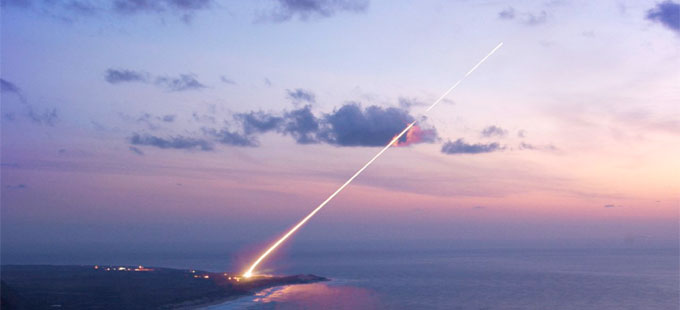Liberal opposition to missile defense has persisted since the 1980s, but the politics may be changing with technological progress and the rising threat from North Korean dictator Kim Jong Un’s nuclear weapons. Congress has an opportunity this summer to notch a rare bipartisan deal that enhances U.S. security.
Kim has already overseen more nuclear and missile tests than his father and grandfather combined, and the Defense Intelligence Agency warns that “if left on its current trajectory” Pyongyang will develop a capacity to hit Japan, Alaska, Hawaii or even the U.S. West Coast. The Trump Administration is pleading with China to stop the North, but Chinese leaders never seem to act and they’re even trying to block regional missile defenses in South Korea.
Meanwhile, the U.S. last month successfully tracked and shot down a mock intercontinental ballistic missile, akin to a bullet hitting a bullet. The Ground-based Midcourse Defense (GMD)—first fielded in 2004 but untested since 2014—has a success rate of nine in 17 intercept trials. But even the failures show the GMD is increasingly effective.
Alaska Senator Dan Sullivan wants to build on this progress with an amendment that would fund a more integrated system, add new interceptors and sensors and increase research. The legislation has united conservatives such as Ted Cruz and Marco Rubio and liberal Democrats such as Gary Peters and Brian Schatz, no small feat in the Trump era.
Systems like the Aegis Ballistic Missile Defense at sea and the Terminal High Altitude Area Defense (Thaad) on the ground can shoot down regional threats within earth’s atmosphere. Only the GMD can hit long-range threats targeting all 50 states, bringing the missiles down in space. All of these systems have separate radars, which have to be coordinated to get a complete picture of a target. The bill aims to create a better integrated system that provides what Mr. Sullivan calls “an unblinking eye.”
This would include advanced space-based sensors. An improved system in space could provide a persistent picture—from launch to interception. If the systems can communicate more efficiently, military brass can make better choices faster.
By the end of 2017 there will be 40 ground-based interceptors at Alaska’s Fort Greely and four at California’s Vandenberg Air Force Base, where the May test was conducted. The bill provides for 28 more interceptors for Fort Greely. Extra interceptors mean more tests and more available to take out threats. This is crucial as the North builds mobile launchers and tries to develop multiple warheads on a single missile.
Some Senators suspect that the Sullivan amendment is little more than home-state pork, but all states would benefit from preventing an attack and the fact of geography is that the trajectory of intercontinental missiles usually requires them to fly over Alaska. The Pentagon is studying whether to place another interceptor site in the Midwest or East Coast.
Opponents say missile defenses are too expensive given that interception might fail, so better to trust arms control and the deterrence of mutual-assured destruction. But arms talks with North Korea have been a fool’s errand since negotiator Robert Gallucci and Bill Clinton bought its promises in 1994.
Even a 50% chance of interception might increase deterrence by making the success of an enemy first strike more doubtful. North Koreans or other rogues also may not be rational actors who fear their own annihilation. U.S. leaders have a moral obligation to do more than let Kim Jong Un hold American cities hostage, and without defenses a pre-emptive military strike might be the only alternative.
The price for the space-based system is classified but no doubt expensive, and it’s difficult to score technologies still under development. But Congress ought to be able to find money to save Seattle from annihilation while arming U.S. troops against conventional threats. If it can’t, voters should at least be able to see who voted against their protection.
The Senate will take up the National Defense Authorization Act in the coming weeks. Mr. Sullivan’s missile-defense amendment would be a down payment on a safer America in an ever more dangerous world.
